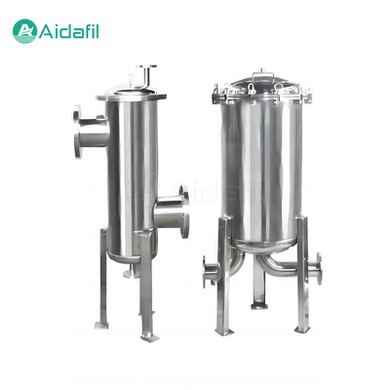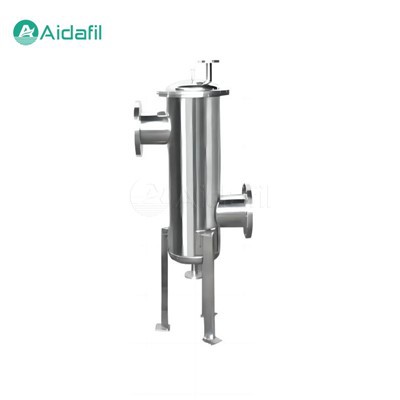
Small Size Single Bag Filter
The small size single bag filter is an efficient, economical and widely used industrial filtration equipment. This filtration system plays an important role in many industries due to its novel structure, small size, simple operation and flexibility. It uses the filter bag to intercept impurities and achieve high-precision separation of liquids.

The small size single bag filter is an efficient, economical and widely used industrial filtration equipment. This filtration system plays an important role in many industries due to its novel structure, small size, simple operation and flexibility. It uses the filter bag to intercept impurities and achieve high-precision separation of liquids. This type of filter is mainly used for solid-liquid separation operations with small and medium flow rates, and is especially suitable for preliminary filtration treatments, such as water purification and pretreatment of raw material liquids.
The design of the single bag filter is simple. The filter bag is mainly supported by a metal mesh basket. The liquid flows in from the inlet and flows out from the outlet after passing through the filter bag. Impurities are intercepted in the filter bag. The design ensures the high efficiency and reliability of the filtration process.
Technical parameters
|
Filtering area |
0.1-0.5m2 |
|
Operating pressure |
1.0Mpa |
|
Filter cylinder diameter |
219mm |
|
Flow rate |
40T/H |
|
Materials |
304, 316 stainless steel |
|
Filtering accuracy |
0.1-100μm |
|
Inlet & outlet caliber |
DN25-DN80 |
Application
The small size single bag filter is widely used in a variety of industries, including water treatment, chemicals, food and beverage, medicine, electronics, and others.
1. Water Treatment Industry
In the field of water treatment, single bag filters are often used to remove particulate impurities such as sediment, rust, and other suspended solids from water. These filters help improve water quality to meet the standards for industrial or domestic water use.
2. Chemical and petrochemical industries
In the chemical and petrochemical industries, single bag filters are used to filter solid particles and impurities in process liquids to ensure the purity and efficiency of chemical reactions. In these applications, the choice of filter material is particularly critical because of the need to resist chemical corrosion and high temperature environments.
3. Food and Beverage Industry
Single bag filters are used in the food industry to filter raw materials such as syrups, cooking oils, etc., to ensure food safety and quality. Filters are usually made of stainless steel or other materials that meet food grade standards to avoid any possible food contamination.
4. Electronics and semiconductor industries
In electronics manufacturing and semiconductor production, single bag filters are used to provide ultrapure water and chemical slurry filtration to ensure that the liquid used in the production process does not contain any impurities that may cause product defects. These industries generally have high requirements for filtration accuracy, so the application of high-precision filter bags in this field is very common.
5. Metalworking Industry
In the metalworking industry, single bag filters are commonly used in industrial cooling water circulation systems to recover precious metals or filter workpiece phosphating fluids. These filters help improve resource efficiency and reduce waste generation.
6. Medical and pharmaceutical industries
In pharmaceutical production, single bag filters are used to ensure the purity of pharmaceutical raw materials and remove insoluble impurities during drug preparation. At the same time, in medical equipment and supply rooms, these filters are also used to ensure the cleanliness of washing water.
Choice of material
The choice of material for a small size single bag filter housing depends on its application environment and filtration requirements. Choosing the right material is not only related to filtration efficiency, but also to the durability and economy of the equipment.
1. Stainless steel material
- Characteristics and advantages. Stainless steel is one of the most commonly used materials, it has good corrosion resistance and high temperature resistance. 304 stainless steel is a common food grade material, suitable for handling liquid filtration in the food and beverage industry. For more harsh environments, such as the presence of more corrosive chemicals, 316L stainless steel provides better resistance to chloride corrosion, suitable for use in the chemical and pharmaceutical industries.
- Application Scenario. Stainless steel single bag filters are widely used in industries such as water treatment, pharmaceuticals, and bioengineering, especially when it comes to high hygiene standards or high corrosion risks.
2. Carbon steel material
- Features and advantages. Carbon steel filters are less expensive and have high strength, but are susceptible to corrosion. A protective coating is usually required to reduce the effects of corrosion.
- Application scenario. Carbon steel filters are suitable for scenarios where hygiene requirements are not high and corrosion resistance is not required, such as basic filtration requirements in some heavy industrial environments.
In addition, when selecting the right single bag filter material, the following key factors need to be considered:
1. Chemical compatibility. Ensure that the selected material is resistant to chemicals in the liquid to be filtered.
2. Temperature tolerance. Consider the highest and lowest temperatures in the process and choose materials that can work stably within this temperature range.
3. Pressure requirements. Select the appropriate material and design strength according to the maximum working pressure of the system.
FAQ
1. Q: What is the function of a filter?
A: The main function of a filter is to remove solid particles, impurities, and harmful substances from liquids or gases, in order to achieve purification, clarification, and protection of equipment.
2. Q: How to choose a suitable filter?
A: When choosing a filter, factors such as the properties of the material being filtered (e.g., viscosity, temperature, corrosion), required filtration accuracy, processing capacity, operating pressure and medium, as well as the type, material, size, and installation method of the filter should be considered.
3. Q: What is the working principle of a filter?
A: The working principle of a filter mainly relies on physical screening, deep interception, absorption, or chemical reactions to remove impurities or harmful components from the material being filtered.
4. Q: How to maintain and care for a filter?
A: Maintenance of filters includes regular cleaning or replacement of filter elements, inspection of seals and fasteners, maintaining stable operating pressure, and avoiding overloading. Specific methods should be referenced from the filter's instruction manual and maintenance guides.
5. Q: What is the service life of a filter?
A: The service life of a filter depends on its working environment, processing volume, and filtration accuracy. Generally, when the filter's pressure drop reaches a certain value or the filtration effect decreases significantly, it needs to be replaced or cleaned.
6. Q: What should be paid attention to during filter installation?
A: During filter installation, attention should be paid to the directionality, ensuring that the fluid enters and exits from the correct ports. Also, the piping system should be cleaned before installation, and the filter should be securely fastened and sealed as required by the instructions.
7. Q: What is the replacement cycle for filters?
A: The replacement cycle for filters depends on their working conditions and filtration requirements, and is usually indicated by pressure difference indicators or timers. When the filter's pressure drop reaches the set value or the filtration effect decreases, it should be replaced in a timely manner.
Why Choose Us
· Professional manufacturer with many years' experience
· Good quality with competitive price
· OEM & ODM are welcome
· Various payment items are acceptable
· Good service by experienced manager
AIDA Philosophy
1. Management Concept:
· Satisfy the customers' demand --- Touch customers, trust with our products and services
· Make employees happy --- Pursue higher material and spiritual happiness
2. Company Mission:
· Focus on customer needs, provide best filtering solution
· To be the lifelong partner with customers
3. Corporate Vision:
· Become a global purification leadership brand
4. Values:
· Customer: Pursue the ultimate experience, enjoy excellent quality
· Team: Trust, responsibility, growth, win-win
· Work: Simple, sincere, efficient, dedicated
Hot Tags: small size single bag filter, China, factory, price, buy, high pressure oil filter for paper mill, PN16 basket strainer, industrial oil filter in lubricating, pressure proof compressed air filter element, durable lube oil filter elements, compressed air coalescing filter in hydraulic system







